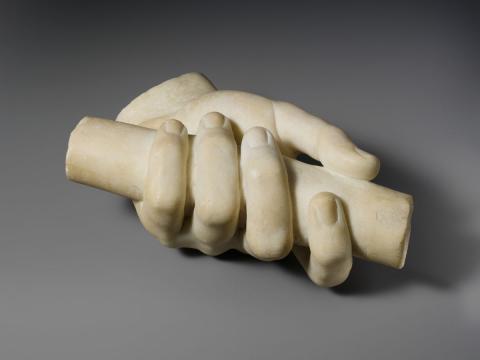Erin Averett, Sarah Bond, Derek Counts, and Bethany Wasik
December 28, 2018
The following post is meant as a impromptu guide to pitching your monograph or edited volume focused on the ancient Mediterranean to an editor at the national conference of the SCS-AIA in San Diego. The catalyst for its formation is a conversation on Twitter with Chelsea Gardner and other young professionals within the fields of classical archaeology, ancient history, and classical philology, who sought advice on pitching their work to editors. The helpsheet was crowdsourced as a google doc between a number of archaeologists, editors, classicists, art historians, and ancient historians who contributed their own experiences and resources. The primary editors were Erin Averett (Creighton University), Sarah Bond (University of Iowa), Derek Counts (University of Wisconsin-Milwaukee), and Bethany Wasik (Cornell Press). What follows is a short but by no means comprehensive guide for preparing to pitch your monograph at the #aiascs annual conference.
Prior to the Meeting in San Diego:
Prior to arriving at the SCS-AIA annual meeting, it is best to email an editor directly a few weeks ahead of time and ask for a meeting. Introduce yourself and give a short (3-4 sentence) outline of the project you wish to discuss publishing, and ideally attach a copy of your book proposal. Typically, these meetings last about 30 minutes and happen in or near the book exhibit. You will be expected to pitch your book or edited volume to the acquisitions editor.
If you have time beforehand, you may wish to enroll in the WCC mentoring program and to contact a scholar who has published a book you admire and wish to emulate in some manner (or reach out if you know an author who has previously published with a particular press you are interested in). If this monograph is meant to address tenure and promotion requirements, make sure to know which presses are accepted by your college or university. Also take into account that certain presses with high degrees of perceived prestige may also have notoriously long publication timetables that may put your tenure and promotion dossier at risk. Be on the lookout for vanity presses where authors pay to have their own work published.
What to bring:
If you have a written prospectus, bring it with you. It is also helpful to bring an updated C.V. and an estimated timeline for completion. If you are transitioning your dissertation to a monograph, be upfront about this fact, as well as the timeline to publication you are expecting.
What to Expect When You’re Expecting a Monograph Contract:
In addition to knowing your own monograph’s strengths and possible weaknesses, you need to know the history of the press you are pitching to and whether your proposed monograph or volume fits in with any current series or field strengths of the press (e.g. do they already have a Late Antiquity series? Do they currently publish heavily in the field of papyrology? Are they known for publishing translations?). Be prepared to articulate how your work contributes to the existing literature on the subject, define your intended audience, and explain why, exactly, your work will be apropos for that particular press. In addition, be ready to ask questions about how and where the press is expanding and trying to define itself. You may also want to inquire into their policies regarding image permissions, possibilities/fees for color images or visuals, and whether they pay for an indexer. Each press is different, so it may help to look at the press’ proposal guidelines (e.g. Harvard University Press’ or Routledge’s) prior to the meeting.
Frequently Asked Editor Questions:
How does your work contribute to the discipline?
How is your work new/innovative?
How does your work fit with the press/series?
What is your intended audience (including classroom)?
What is the market for your publication?
What is your estimated scale//word count/figure count?
What is your timeline?
Frequently Asked Questions from Authors to Editors:
What are your image and indexing policies?
What are the possibilities/fees for color figures?
What is the average time for a book to be produced once I have submitted the final manuscript?
Do I have to copy-edit myself (beware that this is the case with Brill Press--though they do provide funds for translators)?
Is there a chance that a contract may be issued before the manuscript is complete based on proposal and sample chapter?
Will my book be available as an open access monograph? If so, how will this affect my readership and royalties?
Finding a Publisher:
AUP subject area guide for presses [PDF]
Selected Acquisition Editors and Publisher Information for Classics, Archaeology, and Ancient History:
Brill Press:
Mirjam Elbers
Cambridge University Press:
Michael Sharp
Cornell University Press:
Bethany Wasik (@BethanyWasik)
Harvard University Press:
Proposal Submission Guidelines
Sharmila Sen (@_sen_sharmila)
Johns Hopkins University Press:
Proposal Submission Guidelines
Catherine L. Goldstead (@cgoldstead)
Lever Press
Press Guidelines and Open Access Mission
Beth M. Bouloukos, Senior Acquisition Editor of the Amherst College Press and the Lever Press
bbouloukos@amherst.edu
Oxford University Press
Proposal Submission Policy
Stefan Vranka
Stefan.Vranka@oup.com
Princeton University Press:
Proposal Submission Guidelines
Matt Rohal (will be at SCS-AIA) (@MattRohal)
Matt_Rohal@press.princeton.edu
Rob Tempio (Won’t be at SCS-AIA) (@robtempio)
Routledge Press:
How to Publish with Us Guidelines
Amy Davis-Poytner
University of California-Berkeley Press:
Eric Schmidt
University of Michigan Press:
For Authors and Prospective Authors
Ellen Bauerle
Edinburgh University Press:
Carol Macdonald, Editor
Assistant commissioning editor:
David Lonergan
University of Wisconsin Press:
Executive Editor, Gwen Walker
gcwalker@uwpress.wisc.edu
Assistant Acquisitions Editor, Amber J. Rose
ajrose2@wisc.edu
Penn Press (University of Pennsylvania):
Deborah Blake, Consulting Editor (Ancient history, ancient philosophy, archaeology)
University of Texas Press:
Jim Burr, Senior Editor
Equinox: Monographs in Mediterranean Archaeology: https://www.equinoxpub.com/home/books/series/monographs-in-mediterranean-archaeology/
A. Bernard Knapp, Editor
Astrom Editions. Studies in Mediterranean Archaeology (SIMA):
http://www.astromeditions.com/series/
Jenny Webb and David Frankel, Editors
American Schools of Oriental Research (ASOR):
Annual of ASOR
William Caraher, Series Editor
Archaeological Reports Series
Hanan Charaf, Series Editor
Oxbow:
https://www.oxbowbooks.com/oxbow/publish-with-oxbow-books-imprint/
Julie Gardiner, Head of Publishing
British Archaeological Reports (BAR):
We know this process can seem overwhelming, but rest assured that there are many of us who have gone through it. Reaching out to senior scholars you know and admire for their advice and mentorship is always recommended. Even Dante had Virgil by his side in order to navigate Hell and Purgatory, and while publishing a monograph is nowhere near as bad as that, it does require a fair amount of preparation, guidance, and careful mapping. Good luck!
Header Image: Marble left hand holding a scroll, Roman, 1st-2ndC CE (Image via the Metropolitan Museum of Art under a CC0).
Authors



